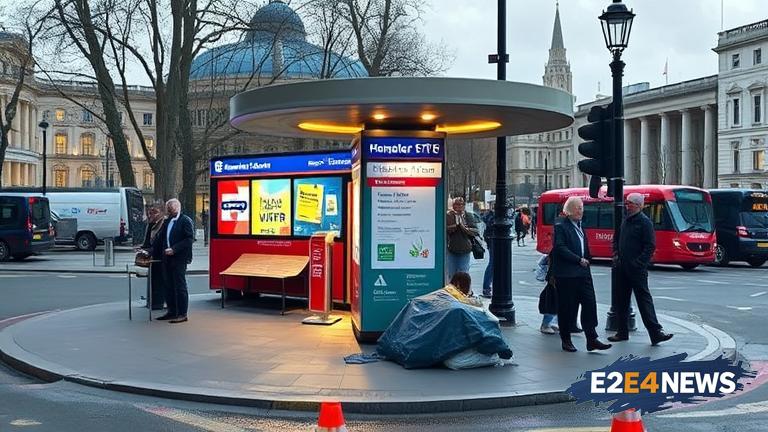A recent development in London has brought attention to the city’s ongoing struggle with homelessness. Transport for London (TfL) has established a homeless hub at Hyde Park Corner, a major transportation intersection. The hub, intended to provide support services for homeless individuals, has sparked controversy among local residents and commuters. Many have expressed concerns about the hub’s location, citing safety and cleanliness issues. Despite these concerns, TfL and local authorities argue that the hub is a necessary step in addressing London’s homelessness crisis. The city has seen a significant rise in homelessness in recent years, with many individuals struggling to access affordable housing and support services. The hub at Hyde Park Corner is part of a broader effort to provide outreach and support to those in need. However, some have questioned the effectiveness of this approach, arguing that it may simply displace homeless individuals from other areas of the city. Others have raised concerns about the potential impact on local businesses and residents. As the debate surrounding the hub continues, it has become clear that London’s homelessness crisis is a complex and multifaceted issue. The city’s authorities must balance the need to provide support services with the concerns of local communities. In recent years, London has seen a significant increase in rough sleeping, with many individuals forced to sleep on the streets due to a lack of affordable housing options. The city’s homelessness crisis is not limited to rough sleeping, however, with many individuals and families struggling to access stable and secure housing. The causes of homelessness are varied and complex, including poverty, lack of affordable housing, and mental health issues. To effectively address the crisis, London’s authorities must take a comprehensive approach, providing support services, affordable housing options, and outreach programs. The hub at Hyde Park Corner is just one part of this effort, but it has highlighted the need for a more nuanced and multifaceted approach to tackling homelessness. As the city continues to grapple with this issue, it is clear that a collaborative effort between local authorities, support services, and community groups will be necessary to make a meaningful impact. The hub has also raised questions about the role of transportation hubs in addressing homelessness, with some arguing that these locations can provide a unique opportunity for outreach and support. However, others have raised concerns about the potential impact on commuters and local residents. Ultimately, the success of the hub at Hyde Park Corner will depend on its ability to provide effective support services and outreach programs, while also addressing the concerns of local communities. As London continues to navigate its homelessness crisis, it is clear that a comprehensive and collaborative approach will be necessary to make a meaningful impact. The city’s authorities must work to provide affordable housing options, support services, and outreach programs, while also engaging with local communities and addressing their concerns. By taking a nuanced and multifaceted approach, London can work towards reducing homelessness and providing support to those in need. The establishment of the hub at Hyde Park Corner is just one step in this effort, but it has highlighted the need for a more comprehensive approach to addressing the city’s homelessness crisis. In the coming months and years, it will be important to monitor the impact of the hub and to continue to develop and refine strategies for addressing homelessness in London. This may involve the establishment of additional hubs or support services, as well as efforts to increase affordable housing options and provide outreach programs. By working together, London’s authorities and community groups can make a meaningful impact on the city’s homelessness crisis, providing support and services to those in need and working towards a more comprehensive solution.
